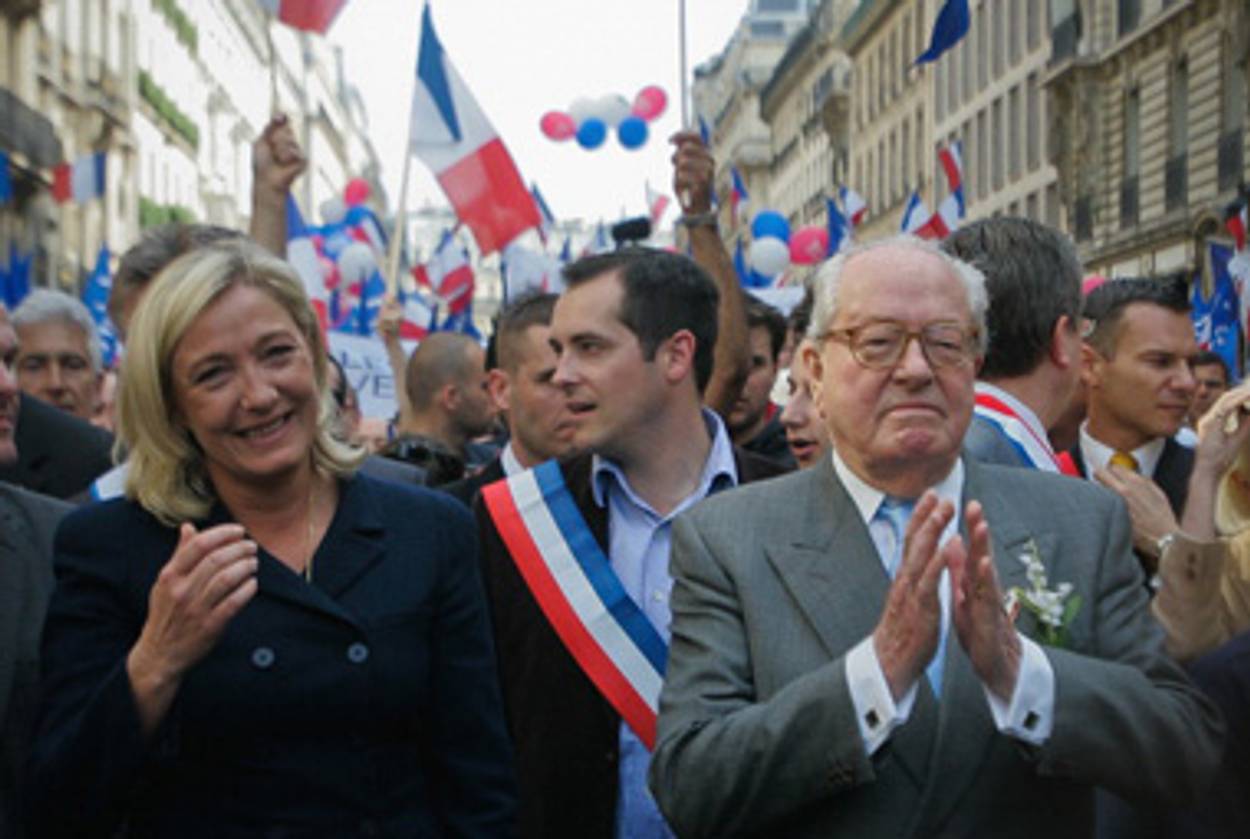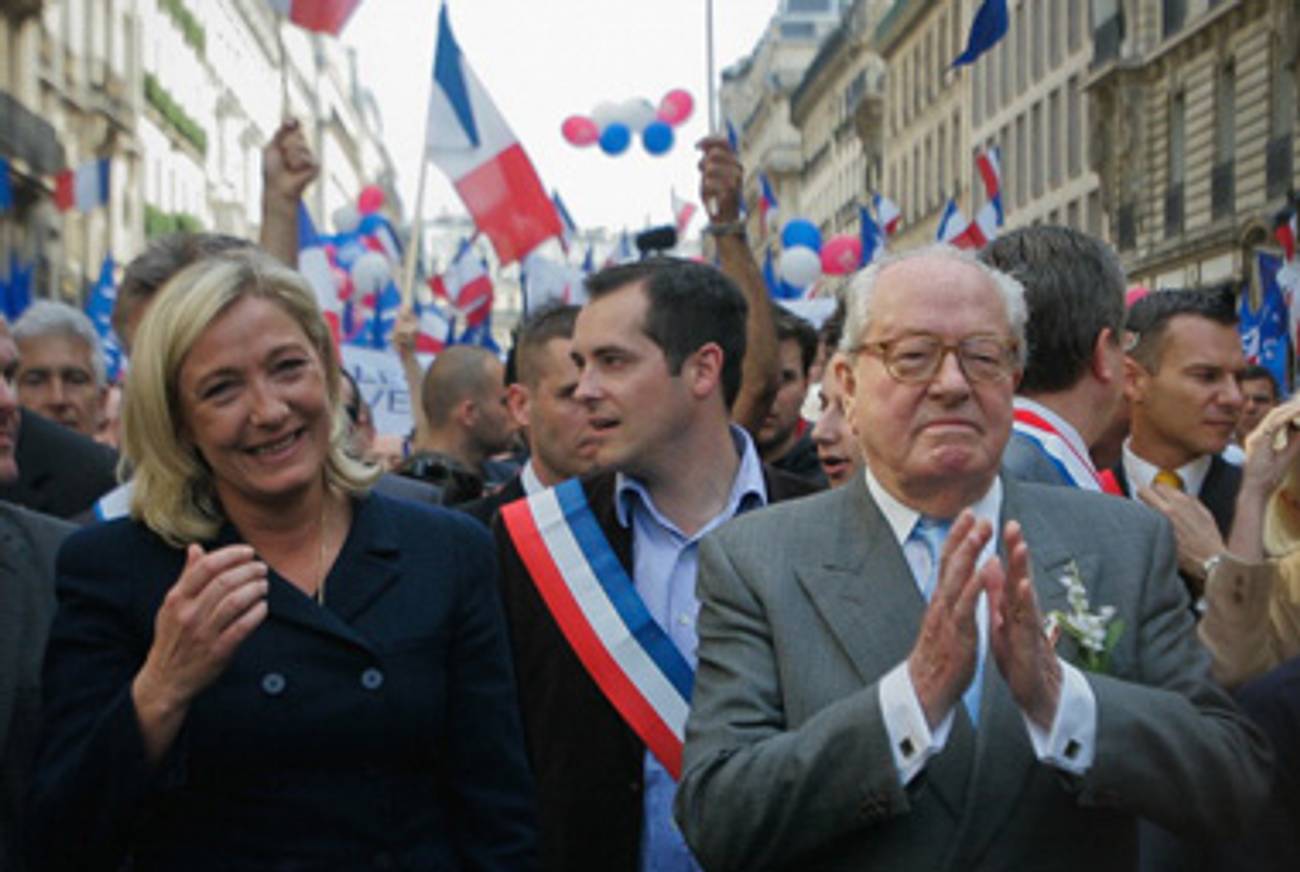Is Marine a Different Animal?
Le Pen, daughter of notorious right-wing French politician, runs for president




Marine Le Pen, eldest daughter of the anti-Semitic French politician Jean-Marie who in 2002 famously qualified for the second round of presidential run-off voting, was profiled in this Sunday’s New York Times Magazine because she intends to run for president next year on the ticket of the National Front party her father helped found.
Le Pen fille has inarguably repudiated her father’s anti-Semitism, although some would argue that it has morphed into her party’s strong anti-immigrant platform and its more-than-whiff of Islamophobia. Arthur Goldhammer, a top blogger on French politics and affiliate of Harvard’s Center for European Studies—oh, and a cousin-of-The-Scroll—found the profile “a remarkably uncritical piece, in my view, quite shocking in the degree to which it lends itself to her effort to differentiate herself from her father.” I asked him over email to tell me more about what Le Pen the Younger represents and what she could mean for French Jews and for Israel.
How is Le Pen like her father?
It is true that Marine Le Pen has worked hard to dissociate herself from her father’s anti-Semitic image. She has explicitly described the Holocaust as the great tragedy of the 20th century and recently expelled a party member who was photographed giving the Nazi salute. But she has retained Bruno Gollnisch, whom she defeated for the party leadership and who, like her father, who remains honorary president of the party, has been convicted of questioning the existence of the Holocaust. Both he and her father marched in the front rank in Sunday’s May Day party parade. Her party does enjoy substantial support from the working class, but working-class anti-Semitism has long existed in France. Ms. Le Pen has focused her message on the economic crisis, but remember that her two likeliest main opponents have Jewish affiliations: Dominique Strauss-Kahn, the head of the International Monetary Fund, is Jewish, and President Nicolas Sarkozy has a Jewish mother. Her attacks on “international financial capital” and on the IMF as the agent of international capital revive age-old extreme right stereotypes associating “international capital” with Jewishness. Indeed, “rootless cosmpolitan” was a code-word for “Jew” in the 1930s, and Le Pen’s attacks on Strauss-Kahn as a man who has abandoned his country to serve the interests of finance in a foreign capital are heard as a dog-whistle by anti-Semites.
A quick reminder: Why should Jews be cautious of the National Front?
Jean-Marie Le Pen, the party’s former leader, referred to the Holocaust as a “minor detail” of the history of World War II and once referred to a Jewish minister, Michel Durafour, as Durafour crématoire, a pun on the French for “crematory oven” (four crématoire). In 1999, he was convicted by a German court of “minimizing the Holocaust.” Others involved in the founding of the Front National came out of extreme right-wing movements associated with anti-Semitism.
Is the difference between her and her father more style or more substance?
It’s quite a bit of both, and her father is reportedly not happy with her reorientation of the party line. He also allegedly advised her not to expel the young member who made the Nazi salute, for fear of alienating “older elements” in the party, who have no problem with this sort of thing.
Do you think Jewishness and anti-Semitism will enter into the presidential campaign?
Covertly, via the kind of symbolism I mentioned above. But even before Marine Le Pen assumed the leadership, anti-Arab and more generally anti-immigrant sentiment had replaced anti-Semitism as the party’s main “social” theme. Since French anti-Semites consider French Jews to be foreigners anyway, the xenophobic line appeals to those hostile to Jews without having to name them.
How does Israel fit into this? As an influential member of the EU and the U.N. Security Council, France is an important country for Israel right now.
The FN has not shown hostility to Israel in recent years because of its emphasis on anti-Muslim themes. Muslims are a much larger “alien” group in France today, and since Israel is an object of Muslim hostility, there has been no reason for an anti-Islamic party to take an anti-Israel line.
Is Sarkozy moving to his right in response to her? And if so, doesn’t that indicate that she has tapped into a broader current in French politics and society?
Sarkozy has long emphasized law-and-order themes, and he has repeatedly promised to tighten enforcement of immigration laws. These issues helped him appeal to extreme-right voters in 2007, and he was thought to have “destroyed” the FN by co-opting its issues. But Marine Le Pen has been able to take back those voters, and in response Sarkozy has tried to revive some of his hard-right themes, but thus far without much effect.
Finally, is there anything more French than—as Marine Le Pen’s mother did—leaving your husband for his biographer?
No comment.
Marine Le Pen, France’s (Kinder, Gentler) Extremist [NYT]
Le Pen in the Times [French Politics]
Marc Tracy is a staff writer at The New Republic, and was previously a staff writer at Tablet. He tweets @marcatracy.